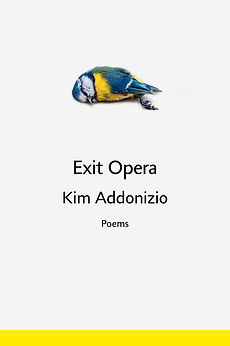

reviewed on November 12, 2024
One of the pioneers—along with figures like Matthea Harvey, Carl Phillips, and Matthew Zapruder, among others—of associative lyricism as it developed throughout the late 1990s and early 2000s, Kim Addonizio may be one of the most influential poets of the past few decades, having established in her eight previous collections and disseminated in her popular craft book, The Poet’s Companion, a breathless and highly mobile poetics much imitated among present-day practitioners.
An Addonizio poem may be disjunctive from line to line, like the roving sequence of thoughts as one falls asleep, but it is often unified by a lightness of tone and an affability of voice, a generosity cut by Addonizio’s carefully measured-out tonic of irony and urbanity. The best of her work organizes itself at the same time around a central idea, an heuristic which prevents the poems from spinning outward centrifugally—as might the work of less adroit associatists—into a scatterplot of merely “weird” or “whimsical” fragments. An Addonizio poem thinks, its syntax continuously complicating itself with a gamut of conjunctions and prepositions which allow her writing—and this has been the promise of the associative mode all along—to approach the subtlety and sinuousness of thought.
In Exit Opera, Addonizio reflects with particular consideration on her own mortality, an increasingly impending concern, she suggests, as the Oakland-based poet enters her eighth decade; the collection’s title names the waning acts, therefore, of the sumptuous opera that is life itself, a climacteric through which Addonizio searches with renewed urgency for some kind of meaning “to vex the annihilating silence.” Addonizio’s spiritualism, though, serves the lesser divinities:
Oh lord, I don’t call anyone Lord.
I believe in the lower-case word,
the tiny multicolored lights strung
over the bar, blinking all year, the hunger
assuaged by peanuts & pork skins,
the benevolent screens of televisions […]
Like other carpe deists before her, Addonizio gathers her rosebuds among life’s transitory pleasures, making hers, as she phrases it in the poem “Another Spring,” the “church of hands, the small doors opening…” Exit Opera is filled with this kind of brief and often sensuous beauty, its chefs “prepar[ing] a tart for its destruction,” its Paris “still there,” its wine “a nice Sancerre with a hint of stony minerality / chilling in the fridge.” Against the obliterations and amnesias of time, in other words, Addonizio counterposes joy, like Herrick’s dying flower, Marvell’s “amorous birds of prey.”
Obviously, as the references suggest, that proposition is hardly an original one.
In her pollyannaism, Addonizio sometimes treads too closely on her predecessors, as when the poem “Aria di Sorbetto”—named for the convention, in the nineteenth-century Italian opera, of an inconsequential solo during which vendors might hawk their sweets—echoes almost verbatim the devotions of Molly Bloom: “if you ask / me to love this world yes, oh yes, / I will.”
As with Joyce, however, Addonizio’s buoyancy pairs gorgeously with the joyousness of her style; what spiritual consolations she arrives at—“Terra Chips, Netflix & opiates, how about you?”—would be far less affecting, even objectionable, were the poems themselves not so delightful, characterized as they are by a wide range of cultural reference, a penchant for surprise, and by the winking charm inherent in the seize-the-day tradition.
It would be a mistake, then, for all their ebullience, their sensuousness, to miss the sophistication of these poems. If the titles in Exit Opera seem to suggest their own kind of inconsequentiality—“Ode to England,” for instance, or “Journey to the End of Season One of American Horror Story”—the work itself nonetheless betrays a subtle, shifting intelligence, as when Addonizio embeds the James Wright locution “break into blossom” into a poem called “Ohio.”
Exit Opera is a splendid performance, as one of the masters of association pursues indefatigably, in poem after poem, in both style and subject matter, the brief but spectacular redemptions available to a world as compromised as our own. In that same poem, “Ohio,” Addonizio offers an imagistic ars poetica for such a pursuit, one which speaks to the futility, desperation, and grandeur of her small joys. “In the nearby cove,” Addonizio writes, “the breaking waves / endlessly bashed themselves against the rocks.”